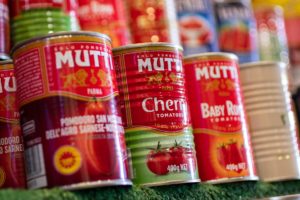As much as it galls me to admit it, I’m not much of a ‘fresh food’ kind of person. While I daydream of walking through my lush, rainforest-like garden in my backyard, teeming with oversized vegetables and happily fluttering butterflies, in reality, I can barely keep a couple of store-bought peppers fresh in my fridge.
Ah, the live-fast/die-young lifestyle of a millennial writer is something, isn’t it? Whether it’s my constant busyness, my distracted mind, or just my sheer laziness, I often find myself having to rely on canned food. While a lot of food purists may roll their eyes at the reliance on what feels like a cooking cheat code, I truly think that canned food is fantastic. I’ve written before about how to capitalise on freezer veg, but today I wanted to talk about why canned food can really make your recipes rock.
Canned food has a reputation of being a little… cheap. Sure, the food inside the can looks and tastes like food, but canned food is a bit of a punchline in our society; think about how many people look down on Spam.
Canned Food and Preservation
 However, when you get right down to it, canned foods, especially canned vegetables, don’t really lose any nutrition in the canning process. Most of the important vitamins and nutritious aspects of vegetables are actually preserved when canned, meaning that it’s not just the vegetables themselves that get preserved, but the important nutrients. While there may be some vitamins that suffer from the high-heat process that is canning, canning actually increases the effectiveness of other nutrients, meaning some foods can become more nutritious if canned.
However, when you get right down to it, canned foods, especially canned vegetables, don’t really lose any nutrition in the canning process. Most of the important vitamins and nutritious aspects of vegetables are actually preserved when canned, meaning that it’s not just the vegetables themselves that get preserved, but the important nutrients. While there may be some vitamins that suffer from the high-heat process that is canning, canning actually increases the effectiveness of other nutrients, meaning some foods can become more nutritious if canned.
Not only are canned vegetables nutritious, but they are also better for the environment. Studies have indicated that between 15 to 20% of fresh food is wasted each year due to expiring quickly and being thrown out (and that’s not even discussing the phenomenon of throwing out bruised or ‘ugly’ fruits and vegetables that happens in supermarkets…)
Canned Food and Zero Waste
The best solution to food wastage is better preservation – hence canning. While the process itself may still produce some waste, canned food increases the shelf life of some foods from days to years, meaning less food will spoil. Interestingly, canned food also helps with portion control. Ever have a recipe that calls for, like, a single carrot? Try buying a single fresh carrot at a grocery store. With canned food, you can easily cut down on over-buying.
In the end, I just like using canned food in recipes – it makes it so much more predictable when a recipe tells me to add two tins of tomatoes rather than going through the effort of peeling, chopping, and measuring 4-5 fresh ones. It may be cooking sacrilege, but at least I’ve said it aloud!
Our culture prizes fresh food, and rightly so – there is a ‘holier-than-thou’ feeling that comes with having something fresh in your soup. In reality, however, it’s cheaper, easier, and sometimes even better for you to stick with canned foods for your recipes.


Want to comment?
Sign in or Register